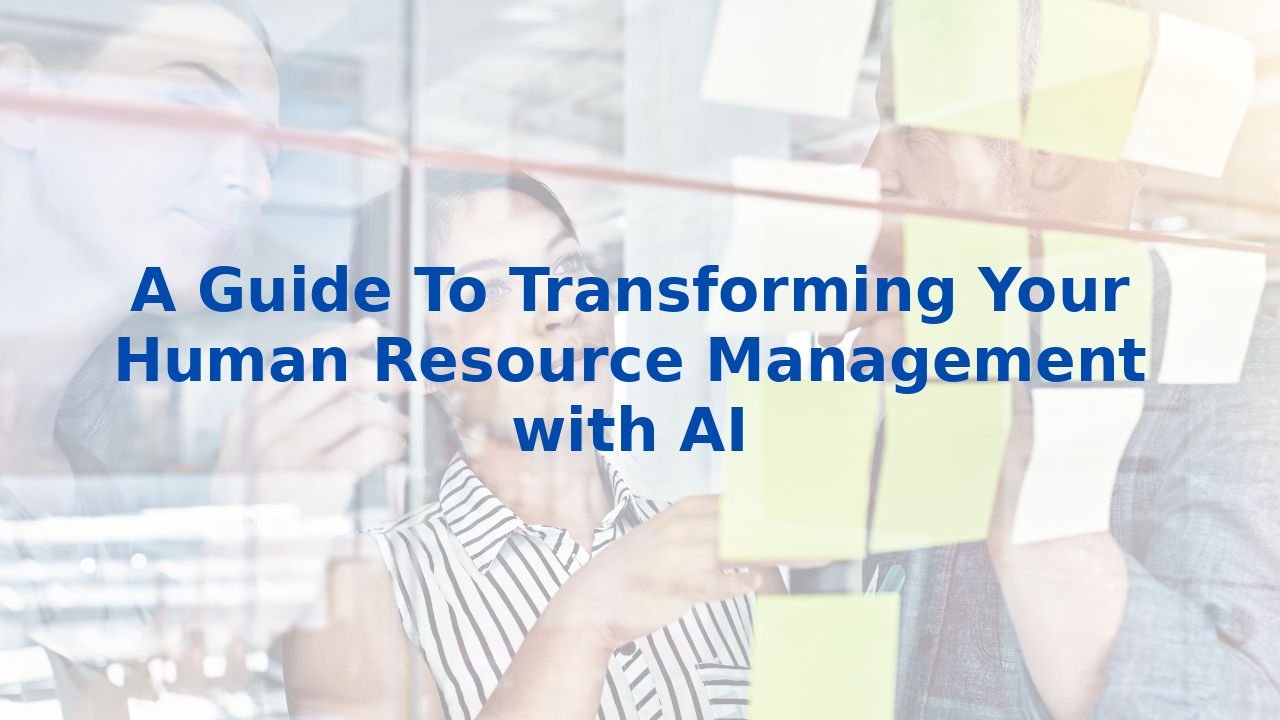A Guide To Transforming Your Human Resource Management with AI
Enhancing Human Resource Management with AI: A Comprehensive Guide
Introduction
In today's fast-paced business landscape, the quest for operational efficiency is more pressing than ever. As companies strive to adapt, one of the most transformative advancements they can embrace is the integration of Artificial Intelligence (AI) into Human Resource Management (HRM). This blog post delves into how AI can not only streamline HR processes but also elevate them, creating a workforce that is agile, dynamic, and thriving.
Recruitment Management
Recruitment is the gateway to building a diverse and capable workforce. AI holds the potential to revolutionize this process. By automating mundane tasks such as resume screening and interview scheduling, organizations can redirect their energy towards strategic initiatives. For example, using AI-powered tools that rely on Natural Language Processing (NLP), companies can meticulously analyze resumes, pinpoint relevant skills, and identify promising candidates more efficiently than ever before.
Moreover, AI-driven chatbots can seamlessly engage with applicants, answering queries and guiding them through initial stages of the recruitment process—this alone can enhance the candidate experience substantially. Imagine the possibility of bringing in quality candidates faster while also enriching the recruitment experience for prospects. That’s the power of AI, transforming recruitment from a daunting task into an engaging journey.
Time & Leave Management
Efficient time and leave management is essential to optimizing workforce productivity. Here, AI is a game-changer. By automating leave requests and tracking attendance, AI can ensure compliance with organizational policies while simplifying the process for employees. Advanced algorithms can analyze patterns in attendance data, aiding HR managers in making informed decisions regarding staffing and resource distribution.
Additionally, AI systems can identify anomalies in attendance records, safeguarding against potential fraud and ensuring that integrity is maintained within the organization. This level of operational insight not only boosts efficiency but also creates a more secure and accountable work environment.
Payroll Management
Payroll can often be a thorn in the side of HR, fraught with complexities that can lead to errors and inefficiencies. AI alleviates these pain points by automating payroll calculations, guaranteeing accuracy while drastically reducing the risk of human error. Picture a world where payroll processing is not only expeditious but also transparent—AI makes this a reality.
With AI, handling tax compliance, benefits administration, and other payroll-related tasks becomes a streamlined process. This liberation from manual effort allows HR professionals to allocate their time towards strategic initiatives that foster organizational growth. Moreover, real-time updates on payroll statuses enhance employee trust and satisfaction, laying the foundation for a more engaged workplace.
Performance Appraisal
Performance appraisals are pivotal in shaping employee careers and ensuring that talents are nurtured. AI elevates this process through the power of data-driven insights. Imagine having access to comprehensive performance reports generated by intelligent algorithms that consider metrics, feedback, and project outcomes in their analysis.
AI can also assist in setting tailored performance goals and crafting personalized development plans for employees, fostering professional growth that aligns with organizational objectives. This synergy not only enhances individual performance but also cultivates a culture of continuous improvement across the organization.
Benefits of AI in HRM
Leveraging AI in HRM translates to numerous advantages:
- Enhanced Efficiency: By automating routine tasks, HR teams can devote their energies to strategic initiatives that drive the organization forward.
- Improved Accuracy: AI ensures precision in complex tasks such as payroll and attendance management, significantly reducing the margin for error.
- Data-Driven Insights: The power of analytics provides HR with valuable insights that facilitate informed decision-making.
- Increased Transparency: From payroll to attendance tracking, AI ensures that all information is accessible and up-to-date.
Training Employees for AI
While the enhanced capabilities of AI offer immense potential, it is crucial to emphasize the importance of training employees to navigate this technology effectively. AI literacy equips teams to understand tools' capabilities, formulate insightful questions, and critically evaluate AI-generated outputs. By investing in education, organizations can ensure that the transformative benefits of AI are fully realized and integrated into the fabric of daily operations.
Conclusion
In conclusion, the incorporation of AI into Human Resource Management can radically reform HR processes, enhancing efficiency and effectiveness from recruitment to performance appraisal. The opportunities are vast, promising a workplace that is not only more productive and accurate but also one that fosters employee satisfaction. By embracing AI and committing to continuous training, organizations are better positioned to unlock the full potential of their human resources, paving the way for a prosperous future.



